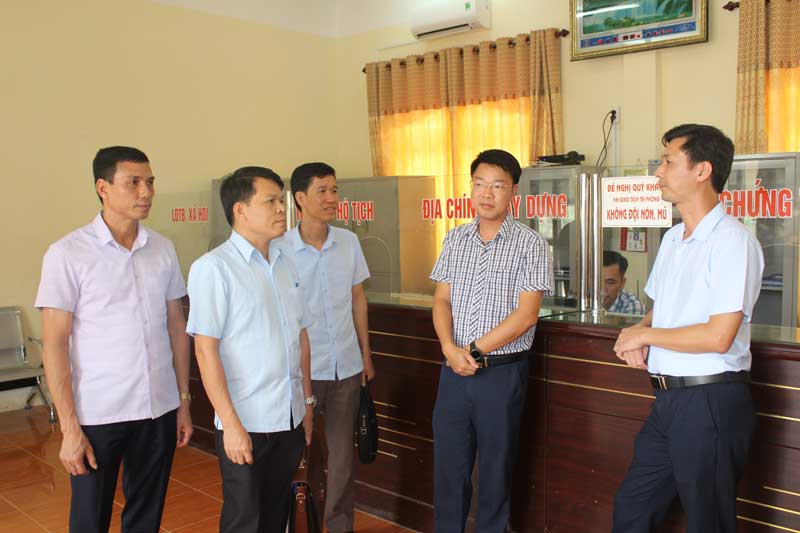
(HBO) - Chi Ne township has publicised administrative procedures, and increased the professionalism of its one-stop service staff.
 Leader of People’s Committee of Chi Ne township speaks on
administrative procedure reform at department receiving documents and paying
back results.
Leader of People’s Committee of Chi Ne township speaks on
administrative procedure reform at department receiving documents and paying
back results.
Since the beginning of this year, the People’s Committee of
Chi Ne township handled nearly 700 administrative procedure documents of all
kinds, with none solved in excess of the time limit.
All procedures are updated online and posted up at the
committee headquarters, thus better serving locals. The township often reviews
groups of administrative procedures so as to remove overlapping and unnecessary
procedures. The time for solving administrative procedures on judicial affairs
and civil status has been shortened.
Chi Ne always pays attention to training and improving the
quality of officials and public servants of the department receiving documents
and paying back results by strictly assessing their capacity, ethic and
behaviour annually.
The local People’s Committee also applies a quality
management system following ISO 9001:2008 and ISO 9001:2015 standards, which is
an effective tool to standardise the process of handling administrative
procedures. In fact, the application of the system has helped improve work
habits of public servants and reduce the time and costs of handling dossiers.
Especially, after Lac Long commune was merged into Chi Ne,
the township Party Committee and authorities quickly stabilised its apparatus
and handled related procedures for locals. In addition, the locality has launched
a movement encouraging youths to learn about a set of procedures and promptly
helped locals if they do not understand. The movement has helped youths,
especially public servants, grasp normal administrative procedures, and uphold
their responsibility./.
Hoa Binh province is undergoing a dynamic transformation amid Vietnam’s national digital transition. Building on Poliburo’s Resolution No. 57-NQ/TW on breakthroughs in science, technology, innovation, and national digital transformation, the province has rolled out a wide range of practical action plans. A standout initiative is the "Digital Literacy for All” movement, an effort to ensure that no one is left behind in the digital era.
Hoa Binh province is undergoing a dynamic transformation in the wake of the national digital transformation movement. Building on Resolution No. 57-NQ/TW of the Politburo on breakthroughs in science, technology, innovation, and national digital transformation, the province has implemented a wide range of practical action plans. A standout initiative is the "Digital Literacy for All” movement ambitious effort to ensure that no one is left behind in the digital age.
With a spirit of unity and proactive problem-solving, the Party Committee, the government and the people of Dong Lai Commune (Tan Lac District) have made great strides in implementing the resolutions of the 24th Party Congress of the commune for the 2020 - 2025 term. Focusing on leadership and practical actions, the commune has brought the Party’s resolutions into daily life, creating strong impacts and pushing the local development forward.
Amid the nationwide push for digital transformation, young people in Hoa Binh Province are stepping up as dynamic pioneers, applying technology to enhance Youth Union operations and expand the reach of youth-led initiatives. Through creativity and adaptability, Youth Union organizations at all levels have introduced a series of practical solutions, contributing to modern governance and community development.
In recent years, An Nghia commune, located in Lac Son district, has stepped up administrative reform, focusing on improving the quality and efficiency of its single-window service unit for receiving and processing administrative procedures. These improvements have helped create favourable conditions for local residents and organisations to handle administrative procedures, contributing to the commune’s broader socio-economic development.
The Prime Minister-approved master plan to develop the multi-use value of forests ecosystems through 2030, with a vision to 2050, aims to improve the management and sustainable use of forest resources, create jobs, increase incomes, and improve the living standards of ethnic minorities, people in mountainous and remote areas, forest workers and those living near forests.



 Leader of People’s Committee of Chi Ne township speaks on
administrative procedure reform at department receiving documents and paying
back results.
Leader of People’s Committee of Chi Ne township speaks on
administrative procedure reform at department receiving documents and paying
back results.